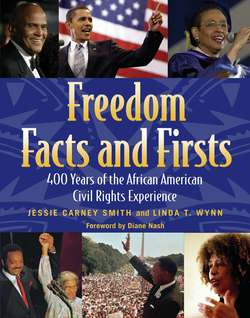Читать книгу Freedom Facts and Firsts - Jessie Carney Smith - Страница 36
На сайте Литреса книга снята с продажи.
Baraka, Amiri (1934–)
ОглавлениеBorn Everett LeRoi Jones in October 7, 1934, in Newark, New Jersey, Amiri Baraka produced an oeuvre of diverse writings. He started as an integrationist, but has changed his black political and artistic thought reflecting society. Following a trip to China and a visit to Cuba, he became aware of the need for political involvement and active participation by artists in bringing about change. This ideological change is evident in his play Dutchman (1964) and his collection of social essays Home (1966), and it becomes even more apparent in his nationalist stance. He changed his name to Imamu Amiri Baraka (later dropping Imamu) and co-edited Black Fire (1968). Both his name and this work define his political vision and reflect the rejection of the integrationist thrust; he thereafter espoused a black nationalist political stance by young black writers and thinkers. With the 1965 assassination of Malcolm X, he and others moved further toward a black consciousness that manifested itself in the Black Arts Movement. It calls for an art by, for, and about the black populace. He spoke as a black nationalist concerned with and addressing the political, social, and cultural needs of black people. His actions and speeches have made him a controversial figure. As a political activist in Newark and on the national scene, he served as chair of the Committee for a Unified Newark (1968–1975) and of the National Black Political Convention (1972). In 2003, the New Jersey General Assembly voted to eliminate the post of State Poet he held because of his poem on the 2001 World Trade Center attack.
Helen R. Houston
